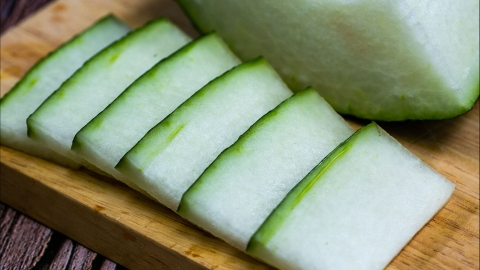What are the dietary recommendations for gallbladder polyps?
In general, the diet for gallbladder polyps should focus on low-fat, low-cholesterol foods that support and protect gallbladder function. Suitable foods include wax gourd (winter melon), oats, steamed sea bass, kiwifruit, and olive oil. Detailed explanations are as follows:

1. **Wax Gourd (Winter Melon)**: This is a low-fat, high-fiber food with high water content, very low calories, and zero cholesterol. The dietary fiber it contains promotes intestinal motility, reduces the stagnation time of bile in the gallbladder, and prevents excessive concentration of bile components that may increase polyp risk. Additionally, its diuretic effect helps regulate metabolism, making it suitable for long-term daily consumption as a vegetable.
2. **Oats**: Rich in beta-glucan, oats can bind to cholesterol in the intestines, reducing cholesterol absorption and thereby lowering cholesterol concentration in bile. This helps prevent cholesterol crystallization and deposition that could worsen polyps. Oats also have a low glycemic index, providing sustained energy and avoiding blood sugar fluctuations that might indirectly impair gallbladder contraction function.
3. **Steamed Sea Bass**: A high-quality, low-fat protein source rich in unsaturated fatty acids. It supplies essential proteins without excessive fat intake, which could otherwise trigger strong gallbladder contractions and increase gallbladder burden. Steaming preserves nutrients to the greatest extent and avoids high-fat cooking methods such as frying or braising, aligning well with dietary principles for patients with gallbladder polyps.
4. **Kiwifruit**: High in vitamin C and dietary fiber, kiwifruit supports antioxidant processes in the body, helping reduce oxidative damage to the biliary tract mucosa and lowering the risk of malignant transformation of polyps. Dietary fiber also promotes bile excretion and prevents bile stasis. With no cholesterol and low calories, kiwifruit is ideal as a between-meal snack.
5. **Olive Oil**: A plant-based oil primarily composed of monounsaturated fatty acids, olive oil has a high smoke point and contains zero cholesterol. Replacing animal fats like lard or butter with olive oil reduces saturated fat intake and helps maintain a balanced cholesterol ratio in bile. Daily intake should be limited to 20–30g, used preferably for salad dressings or quick stir-frying at low temperatures, avoiding high-temperature frying that may degrade its nutritional value.
To avoid unnecessary harm to the body, it is recommended to develop a personalized diet plan under the guidance of a healthcare professional. During dietary management, maintain healthy lifestyle habits and avoid spicy, irritating foods.






